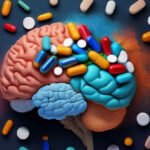Introduction
Discover the benefits of tryptophan and melatonin for sleep, mood, and longevity. Learn how these natural compounds support serotonin production, regulate circadian rhythms, and enhance overall well-being. Sleep and mood regulation are essential for overall well-being, and two natural compounds—tryptophan and melatonin—play a key role in maintaining these functions. Tryptophan, an essential amino acid, serves as a precursor to serotonin and melatonin, both of which influence mood and sleep quality. Melatonin, a hormone produced by the pineal gland, directly regulates the body’s sleep-wake cycle. When combined, these two compounds can offer enhanced benefits for mental health, sleep improvement, and longevity.
What is Tryptophan?
Tryptophan is one of the 20 amino acids that act as building blocks of proteins. As an essential amino acid, the body cannot synthesize it on its own and must obtain it from dietary sources such as poultry, dairy, eggs, nuts, and seeds. Tryptophan is crucial for serotonin production, which in turn supports melatonin synthesis and mood stability. It also plays a role in cognitive function, stress response, and metabolic health.
What is Melatonin?
Melatonin is a hormone secreted by the pineal gland in response to darkness, helping regulate circadian rhythms. Its production can be disrupted by factors such as artificial light exposure, stress, and aging. Supplementing with melatonin can aid in sleep regulation, especially for individuals with irregular sleep patterns. Additionally, melatonin has been found to possess antioxidant and anti-inflammatory properties, contributing to overall cellular health and potentially influencing aging and disease prevention.
The Role of Tryptophan in the Body
- Serotonin Production – Tryptophan is converted into serotonin, a neurotransmitter responsible for mood stabilization, anxiety reduction, and emotional well-being. Low serotonin levels have been linked to depression and mood disorders.
- Melatonin Synthesis – Serotonin, derived from tryptophan, is further converted into melatonin, which supports sleep-wake regulation. Tryptophan supplementation can help individuals struggling with sleep disturbances.
- Niacin (Vitamin B3) Production – Tryptophan is also a precursor to niacin, which is essential for energy metabolism, cardiovascular health, and nervous system function.
- Gut Health and Immune Support – A significant portion of serotonin production occurs in the gut, where tryptophan plays a role in maintaining digestive and immune system balance.
The Benefits of Combining Tryptophan and Melatonin
- Improved Sleep Quality – Since tryptophan aids in serotonin and melatonin production, supplementing with both can enhance sleep onset, depth, and duration.
- Mood Regulation – Tryptophan supports serotonin levels, helping alleviate anxiety and depression. Melatonin also influences emotional well-being, making the combination beneficial for mental health.
- Jet Lag and Shift Work – Combining tryptophan and melatonin can assist in resetting the body’s circadian rhythm, making it useful for travelers and shift workers adjusting to new schedules.
- Stress and Anxiety Reduction – Melatonin’s calming effect, combined with serotonin’s mood-enhancing properties, can help reduce stress and improve relaxation.
Tryptophan and Melatonin for Older Adults and Longevity
Aging is associated with reduced melatonin production and altered serotonin metabolism, which can contribute to sleep disorders, mood disturbances, and cognitive decline. Tryptophan and melatonin supplementation may offer significant benefits for older adults, including:
- Enhanced Sleep Patterns – Older adults often experience fragmented sleep and early awakenings due to diminished melatonin levels. Supplementation can improve sleep quality and duration.
- Cognitive Function and Brain Health – Adequate serotonin levels, supported by tryptophan intake, may reduce the risk of neurodegenerative diseases like Alzheimer’s. Melatonin’s antioxidant properties also protect against cognitive decline and neuroinflammation.
- Mood Stabilization and Reduced Anxiety – Tryptophan-derived serotonin supports emotional well-being, reducing the risk of depression, which is more common in aging populations.
- Potential Longevity Benefits – Melatonin has been shown to possess antioxidant and anti-inflammatory properties, which may contribute to healthier aging and longevity. Some research suggests it may help protect against age-related diseases and oxidative stress by promoting mitochondrial function and cellular repair.
Tryptophan and Melatonin for Athletic Performance and Recovery
Athletes rely on proper sleep, mood balance, and recovery for optimal performance. Tryptophan and melatonin supplementation may offer several benefits:
- Improved Sleep for Recovery – Sleep is crucial for muscle repair and overall recovery. Tryptophan and melatonin support deep sleep, reducing muscle fatigue and enhancing recovery after workouts.
- Mood and Mental Resilience – High levels of stress and anxiety can affect athletic performance. Tryptophan boosts serotonin, helping to stabilize mood, while melatonin aids relaxation and stress reduction.
- Reduced Inflammation and Oxidative Stress – Melatonin has antioxidant and anti-inflammatory properties, which may reduce exercise-induced oxidative damage and speed up recovery.
- Enhanced Endurance and Performance – Serotonin levels, supported by tryptophan intake, may improve focus and endurance during prolonged training sessions.
- Prevention of Overtraining Syndrome – Overtraining can lead to burnout, depression, and poor sleep. Regulating serotonin and melatonin levels may help mitigate these risks, ensuring balanced recovery and performance.
Synergistic Supplements with Tryptophan [View on Amazon] and Melatonin [View on Amazon]
Several other supplements work well with tryptophan and melatonin to enhance sleep, mood, and overall health:
- Magnesium – Helps activate enzymes involved in serotonin and melatonin production, promoting relaxation and better sleep.[View on Amazon]
- Vitamin B6 – Essential for converting tryptophan into serotonin, making it a key cofactor in mood and sleep regulation.[View on Amazon]
- GABA (Gamma-Aminobutyric Acid) – A calming neurotransmitter that works well with melatonin to promote deeper sleep and reduce stress.[View on Amazon]
- L-Theanine – Found in green tea, it enhances relaxation, improves sleep quality, and reduces anxiety when combined with tryptophan and melatonin.[View on Amazon]
- Zinc – Plays a role in neurotransmitter function and has been linked to improved sleep when taken with tryptophan.[View on Amazon]
- Ashwagandha – An adaptogen that reduces cortisol (stress hormone) levels, helping melatonin function more effectively.[View on Amazon]
- Taurine – Regulates neurotransmitter systems like GABA and glycine, amplifying the calming effects of tryptophan and melatonin, while supporting overall nervous system health.[View on Amazon]
- Glycine – An amino acid that enhances sleep quality, works with melatonin to improve deep sleep, and supports cognitive function.[View on Amazon]
- 5-HTP (5-Hydroxytryptophan) – A direct precursor to serotonin, which can further support tryptophan’s effects on mood and sleep.[View on Amazon]
Conclusion
Tryptophan and melatonin work synergistically to support mood, sleep quality, and overall well-being. Their benefits extend to aging populations, athletes, and those experiencing stress or sleep disturbances. By incorporating tryptophan-rich foods and strategically using melatonin, individuals can harness the power of this duo to enhance their health and longevity. Additionally, pairing them with complementary nutrients can maximize their effectiveness. As with any supplement regimen, consulting a healthcare provider is crucial to ensure safety and effectiveness.
Note: This page contains affiliate links. If you purchase through these links, we may earn a small commission at no extra cost to you. Thank you for supporting our work!










